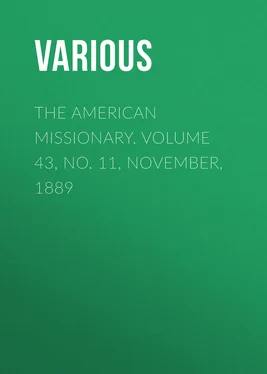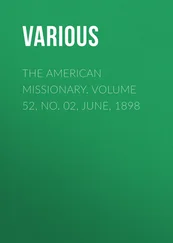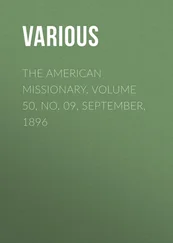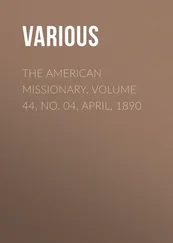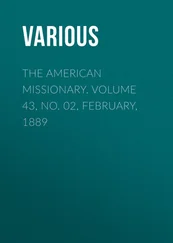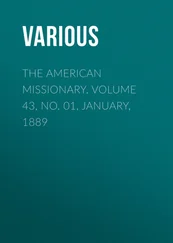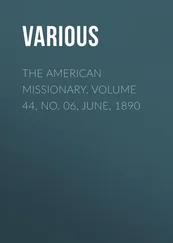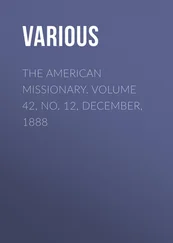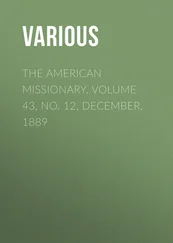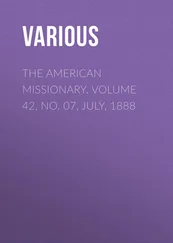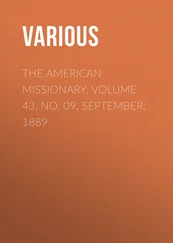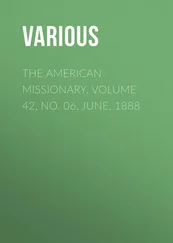Various - The American Missionary. Volume 43, No. 11, November, 1889
Здесь есть возможность читать онлайн «Various - The American Missionary. Volume 43, No. 11, November, 1889» — ознакомительный отрывок электронной книги совершенно бесплатно, а после прочтения отрывка купить полную версию. В некоторых случаях можно слушать аудио, скачать через торрент в формате fb2 и присутствует краткое содержание. Жанр: foreign_antique, periodic, foreign_edu, на английском языке. Описание произведения, (предисловие) а так же отзывы посетителей доступны на портале библиотеки ЛибКат.
- Название:The American Missionary. Volume 43, No. 11, November, 1889
- Автор:
- Жанр:
- Год:неизвестен
- ISBN:нет данных
- Рейтинг книги:4 / 5. Голосов: 1
-
Избранное:Добавить в избранное
- Отзывы:
-
Ваша оценка:
- 80
- 1
- 2
- 3
- 4
- 5
The American Missionary. Volume 43, No. 11, November, 1889: краткое содержание, описание и аннотация
Предлагаем к чтению аннотацию, описание, краткое содержание или предисловие (зависит от того, что написал сам автор книги «The American Missionary. Volume 43, No. 11, November, 1889»). Если вы не нашли необходимую информацию о книге — напишите в комментариях, мы постараемся отыскать её.
The American Missionary. Volume 43, No. 11, November, 1889 — читать онлайн ознакомительный отрывок
Ниже представлен текст книги, разбитый по страницам. Система сохранения места последней прочитанной страницы, позволяет с удобством читать онлайн бесплатно книгу «The American Missionary. Volume 43, No. 11, November, 1889», без необходимости каждый раз заново искать на чём Вы остановились. Поставьте закладку, и сможете в любой момент перейти на страницу, на которой закончили чтение.
Интервал:
Закладка:
Various
The American Missionary – Volume 43, No. 11, November, 1889
FREE ONCE MORE
At the close of our fiscal year in 1887, we were enabled to utter the joyful word "Free," no debt darkening our balance sheet. Last year (1888) we were compelled to moderate our tone and say "Not quite free," for a balance of $5,641.21 stood on the wrong side of our ledger. But now, in the good providence of God, we can say "Free once more."
Our receipts from all sources were $376,216.88; payments, including debt of last year, $371,745.21, leaving a credit balance of $4,471.67. For this good result we are in some measure indebted to legacies. But, under all circumstances, we rejoice in the past and look forward with hope to the future. The work we have in hand, with its grand results, as will be seen in the "General Survey" published in this number of the MISSIONARY, will encourage our friends, and the call there made for growth and enlargement, will, we are sure, stimulate them to increased contributions and more earnest prayer. The "Survey" will also contain a statement of the income and expenditure of the Hand Fund.
THE NATIONAL COUNCIL
The gathering of this representative body of the Congregational churches of this country was the largest ever held. It grappled more fully than any of its predecessors had done with great questions touching the missionary and benevolent societies in their relations to the churches and to each other, and the consolidation of the missionary magazines. The most exciting topic discussed was that of the Georgia Congregational Churches, white and colored. The result reached on this point was that the representatives of two District Conferences were enrolled, and that the representative of the United Congregational Conference of Georgia was given a seat as an honorary member.
THE COLORED DELEGATES
The Southern Associations were represented by six colored delegates in the National Council. Their bearing and ability won the respect and admiration of the whole Council. They were modest and manly in their deportment, prudent in their counsels and very eloquent in their speech. They showed themselves to be the peers of their white brethren, and demonstrated beyond a question the capacity of the colored man for the highest intellectual and moral training. They were a credit to the American Missionary Association, whose pupils they have been, and were a living and triumphant vindication of its work at the South.
THE MOHONK CONFERENCE
The seventh annual gathering of this Conference, Oct. 2-5, was the largest ever assembled. Among those present for the first time were Ex-President Hayes, Gen. O.O. Howard, Gen. John Eaton, Prof. Wayland and Dr. Wayland. The newspaper press, religious and secular, was very fully represented; Abbott, Buckley, Dunning, Gilbert, Ward and Wayland are perhaps best known. The venerable Judge Strong well represented the law, while the absence of Senator Dawes was sincerely regretted.
A marked feature of the Conference was the presence of Gen. Morgan, Commissioner of Indian Affairs. For weeks prior to the meeting of the Conference, rumors had gone abroad that he intended to abolish the "contract schools"—that is, schools of the missionary societies which the Government by a "contract" agrees to assist. Articles had appeared in the newspapers remonstrating against this course, and it was believed that this topic would be one of most practical interest in the Conference. The Commissioner early in the meetings read a paper outlining his plan for the establishment of Government schools for all Indian children—the attendance to be compulsory. The omission of all mention of the "contract schools" in this paper confirmed the impression to which rumor had given currency. An animated discussion followed the reading of his paper, in which the Commissioner freely participated. It appeared that he had been misunderstood—at least in so far as any immediate curtailment of the "contract schools" is concerned, and he impressed the Conference warmly in his favor as a Christian man with broad views, impartial and progressive. He will meet, we feel sure, with the cordial support of all the societies engaged in Indian educational work.
The final action of the Conference was embodied in a platform substantially repeating the utterances of last year, urging national education for all Indian children and approving the continuance of "contract schools." Other planks of the platform related to lands in severalty, to the legal rights of the Indians, etc.—all of which were unanimously approved, and thus once more this remarkable Conference followed its predecessors in free and frank debate, consummated by entire harmony in the result.
The varied and unique scenery of Lake Mohonk was shown at its best by three days of bright and bracing weather. The welcome of Mr. and Mrs. Smiley to their increased number of guests, who taxed to the utmost limits the accommodations of the large establishment, was as cordial and genial as ever. The hearty and enthusiastic vote of thanks, the only compensation permitted, was a far less reward than the gratification of their own benevolent feelings in doing good; and that gratification is probably to be enhanced by the calling together of another Conference in the early summer in behalf of a still larger class of our needy fellow-citizens than the Indians.
NOTES FROM NEW ENGLAND
A good friend of the American Missionary Association in a New England village recently greatly stirred up the interest of the people in behalf of our work, through a missionary society which she organized among the children. They had meetings for sewing, preparing articles for a box, and then a fair, in which they sold other articles that they had made, out of which they gathered a considerable sum of money. The interest went far beyond the children. A gentleman, not a member of the church, who had never been interested in missionary work, was stirred up by the solicitation of the children, and gave both time and money to their effort. He afterwards said to a good lady who inaugurated the movement, "I am glad I have given to this cause; it makes me feel good, and I want to keep right on giving." That is the way it affects every one when the heart and pocket-book are open to these missionary objects. It makes them feel good, and stirs up a desire to continue the process.
The Christian Endeavor Societies of New England are assisting nobly in the work of the American Missionary Association. One society pledges itself to support a missionary in our field for a year. Another makes one of its number a Life Member of our Association, contributing thirty dollars. Still another brings in a handsome collection recently taken, and still another devotes the prayer meeting evening to thorough study upon the work that is being done through the A.M.A., in the needy and destitute portions of our country. One young man who spoke at the last meeting spent a portion of his vacation in studying up the work among the Highlanders of the South, and gave the results of his study at their meeting. And why should not this active society of earnest young people be interested in the great work that is being accomplished among other young people, painfully in want of the advantages which those here enjoy? A prayer meeting pledge of the Y.P.S.C.E., printed in the Sioux language by Indian boys at a Santee school, is a most interesting evidence that this society is not confined in its usefulness to any locality or race. A vigorous Society is one of the elements of work in this Indian school, and a most useful element. In a letter written by an Indian boy is the following: "We have a Christian Endeavor Society here. I joined that society not very long ago, and we have nice meetings on Saturday night. It does make me feel good in those meetings. There are about thirty members now." And so these Societies of New England in their prayers for, and contributions to, the work of the American Missionary Association, are clasping hands with the same societies among the Negroes, Mountain people and Indians.
Читать дальшеИнтервал:
Закладка:
Похожие книги на «The American Missionary. Volume 43, No. 11, November, 1889»
Представляем Вашему вниманию похожие книги на «The American Missionary. Volume 43, No. 11, November, 1889» списком для выбора. Мы отобрали схожую по названию и смыслу литературу в надежде предоставить читателям больше вариантов отыскать новые, интересные, ещё непрочитанные произведения.
Обсуждение, отзывы о книге «The American Missionary. Volume 43, No. 11, November, 1889» и просто собственные мнения читателей. Оставьте ваши комментарии, напишите, что Вы думаете о произведении, его смысле или главных героях. Укажите что конкретно понравилось, а что нет, и почему Вы так считаете.
